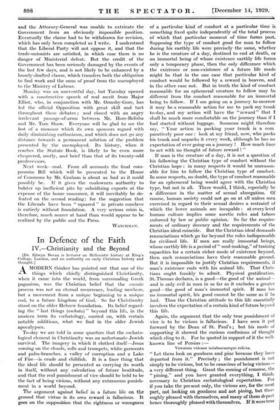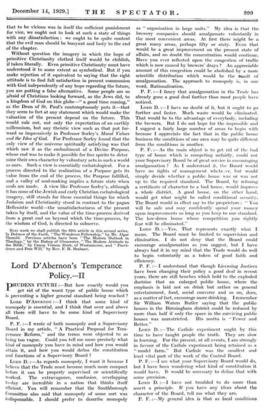In Defence of the Faith
IV.—Christianity and the Beyond
[Dr. Edwyn Bevan is lecturer on Hellenistic history at King's College, London, and an authority on early Christian history and thought.]
AMODERN thinker has pointed out that one of the things which chiefly distinguished Christianity, when it came into the world, from surrounding Greek paganism, was the Christian belief that the cosmic process was not an eternal recurrence, leading nowhere, but a movement from a unique beginning to a unique end, to a future kingdom of God. So far Christianity stood on the older Hebrew foundation. Its belief regard- ing the " last things (eschata)" beyond this life, in the modern term its eschatology, carried on, with certain notable additions, what we find in the older Jewish apocalypses.
To-day we are told in some quarters that the eschato- logical element in Christianity was an unfortunate Jewish survival. The imagery in which it clothed aself—Jesus coming on the clouds, rolls anit trumpets, white garments and palm-branches, a valley c-f corruption and a Lake of Fire—is crude and childish. It is a finer thing that the ideal life should be presented as carrying its worth in itself, without any calculation of future beatitude, and that the real punishment of vice should be held to be the fact of being vicious, without any extraneous punish- ment in a world beyond.
The argument against belief in a future life on the ground that virtue is its own reward is fallacious. It goes on the Supposition that the rightness or wrongness of a particular kind of conduct at a particular time is something fixed quite independently of the total process of which that particular moment of time forms part. Supposing the type of conduct good for man to follow during his earthly life were precisely the same, whether he is the creature of a day, destined to end at death, or an immortal being of whose existence earthly life forms only a temporary phase, then the only difference 'which the existence or non-existence of a future life made might be that in the one case that particular kind of conduct would be followed by a reward in heaven, and in the other case not. But in truth the kind of conduct reasonable for an ephemeral creature to follow may be different from the conduct reasonable for an immortal being to follow. If I am going on a journey to-morrow it may be a reasonable action for me to pack my trunk to-day, and my action will have the " reward " that I shall be much more comfortable on the journey than if I had started without luggage. Someone might therefore say, " Your action in packing your trunk is a coin paratively poor one : look at my friend, now, who packs his trunk and unpacks it every week, although he has no expectation of ever going on a journey ! How much finer to act with no thought of future reward ! "
If man is the creature of a day, it is not a question of his following the Christian type of conduct without the Christian hope : in many respects it would be unreason- able for him to follow the Christian type of conduct. In some respects, no doubt, the type of conduct reasonable for an ephemeral being would agree with the Christian type, but not in all. There would, I think, especially be a difference in the matter of sexual abnegation. Of course, human society could not go on at all unless men exercised in regard to their sexual desires a restraint of which the lower animals are incapable : at every level human culture implies some ascetic rules and taboos enforced by law or public opinion. So far the require- ments of ordinary decency and the requirements of the Christian ideal coincide. But the Christian ideal demands renunciations which go far beyond the rules indispensable for civilized life. If men are really immortal beings, whose earthly life is a period of " soul-making," of training capacities for a certain richer mode of existence beyond, then such renunciations have their reasonable ground. But it is impossible to justify Christian requirements, if man's existence ends with his animal life. That Chris- tians ought frankly to admit. Physical gratification, St. Thomas declares, is a good—the good of the animal— and is only evil in man in so far as it excludes a greater good—the good of man's immortal spirit. If man has no immortal spirit, his good cannot be the same as if he had. Thus the Christian attitude to this life essentially involves the expectation of a certain kind of future beyond this life.
Again, the argument that the only true punishment of vice is to be vicious is fallacious. I have seen it put forward by the Dean of St. Paul's ; but his mode of supporting it showed the curious confusions of thought which cling to it. For he quoted in support of it the well- known line of Persius :— Virtutem videant intahescantque relicts.
" Let them look on goodness and pine because they have departed from it." Precisely ; the punishment is not simply to be vicious, but to be conscious of being vicious— a very different thing. Grant the coming of remorse, the " pining," and you have granted everything, I think, necessary to Christian eschatological expectation. For if you take the present only, the vicious are, for the most part, not looking on goodness and not pining, but thor- oughly pleased with themselves, and many of them depart hence thoroughly pleased with themselves, If it were true that to be vicious was in itself the sufficient punishment for vice, we ought not to look at such a state of things with any dissatisfaction : we ought to be quite content that the evil man should be buoyant and lusty to the end of the chapter.
_ Without question the imagery in which the hope of primitive Christianity clothed itself would be childish, if taken literally. Even primitive Christianity must have understood it to some extent as symbolical. But if you make rejection of it equivalent to saying that the right attitude is to find full satisfaction in present communion with God independently of any hope regarding the future, you are putting a false alternative. Some people are so afraid of Christians looking forward, as the Jews did, to a kingdom of God on this globe—" a good time coming," as the Dean of St. Paul's contemptuously puts it—that they seem to fret at any statement which would make the valuation of the present depend on the future. This would rule out, not only the expectation of an earthly millennium, but any theistic view such as that put for- ward so impressively in Professor Sorley's Moral Values and the Idea of God. For Professor Sorley found that the only view of the universe spiritually satisfying was that which saw it as the embodiment of a Divine Purpose, whose end was to make it possible for free spirits to deter mine their own character by voluntary acts in such a world as ours. Such a view is essentially eschatological. For a process directed to the realization of a Purpose gets its value from the end of the process, the Purpose fulfilled, and a valley of soul-making implies a future state when souls are made. A view like Professor Sorley's, although it has none of the Jewish and early Christian eschatological imagery, still stands for those essential things for which Judaism and Christianity stood in contrast to the pagan Hellenistic world—the unsatisfactoriness of the present taken by itself, and the value of the time-process derived from a great end on beyond which the time-process, by the wisdom of God, is directed to subserve.
Next week we shall publish the fifth article in this second series, In Defence of the Faith, "The Wondrous Fellowship," by Mr. Algar Thorold. Previous articles have been " The Modern Outlook in Theology," by the Bishop of Gloucester, " The Modern Attitude to the Bible," by Canon Vernon Storr, of Westminster, and " Provi- dence and Free Will," by Rev. F. R. Brabant.













































 Previous page
Previous page